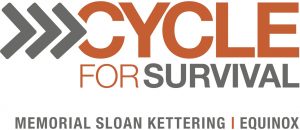Cycle for Survival: Ten Years of Impact: Memorial Sloan Kettering Cancer Center and Equinox
 High-performance lifestyle leader Equinox is the founding partner of Cycle for Survival, the movement to beat rare cancers, which is owned and operated by Memorial Sloan Kettering Cancer Center.
High-performance lifestyle leader Equinox is the founding partner of Cycle for Survival, the movement to beat rare cancers, which is owned and operated by Memorial Sloan Kettering Cancer Center.
One thing is for sure: Cycle for Survival is about movement. Each year, at Equinox locations across the country, tens of thousands of participants gather to ride stationary bikes as part of Cycle for ![]() Survival’s annual series of indoor team cycling events. Participants celebrate their months of tireless fundraising for rare cancer studies, clinical trials and major research initiatives led by MSK.
Survival’s annual series of indoor team cycling events. Participants celebrate their months of tireless fundraising for rare cancer studies, clinical trials and major research initiatives led by MSK.
During its 10th year in 2016, Cycle for Survival reached the $100 million fundraising mark; 100 percent of all donations go directly to research led by MSK. Since then, fundraising has remained strong; this year, Cycle for Survival surpassed a total of $140 million raised for the cause since it was founded in 2007.
In February and March 2016, about 27,000 riders participated in the events and more than 180,000 donors contributed. Cycle for Survival garnered coverage on Good Morning America, in Fast Company, People and many other outlets. Leveraging social media channels, the program successfully reached national trending status on Instagram.
Equinox incorporated Cycle for Survival branding throughout its clubs, and led campaigns to increase donations. Club initiation fees, as an example, were donated to Cycle for Survival during a certain period, and $1 was donated for every 10 miles pedaled in Equinox’s indoor cycling classes. Cycle for Survival had multiple PR and social media campaigns, and a sponsorship program that included New Balance, smartwater and others. Celebrities such as Seth Meyers, Uma Thurman and Misty Copeland participated at the events. Cycle for Survival lit the Empire State Building in orange and rang the opening bell at the New York Stock Exchange, making the cause nearly impossible to miss.
MSK and Equinox raised awareness of rare cancer research and raised $30 million in the 2016 campaign. With its combined contributions over its first 10 years of its existence, Cycle for Survival has funded many groundbreaking clinical trials and research studies that otherwise wouldn’t have had the resources to proceed. For example, funds supported a first-ever clinical trial for a particular type of ovarian cancer that few women survive. Innovative technology that has received funding includes a state-of-the-art DNA sequencer that processes tumor samples as well as a liquid biopsy system.
